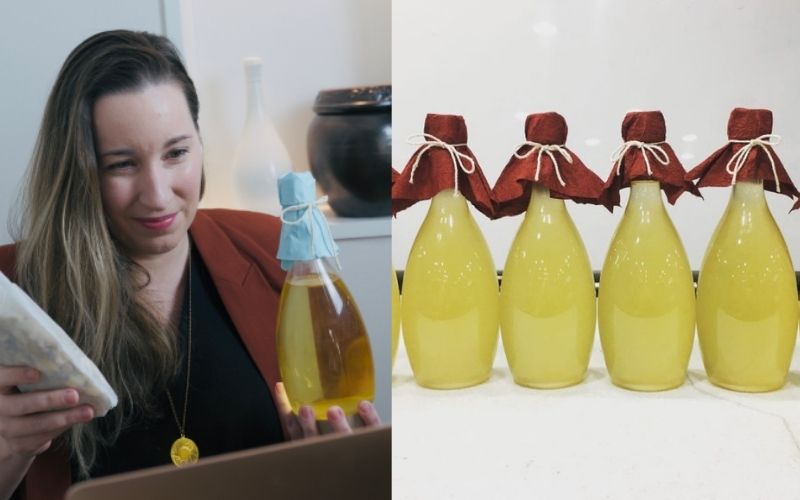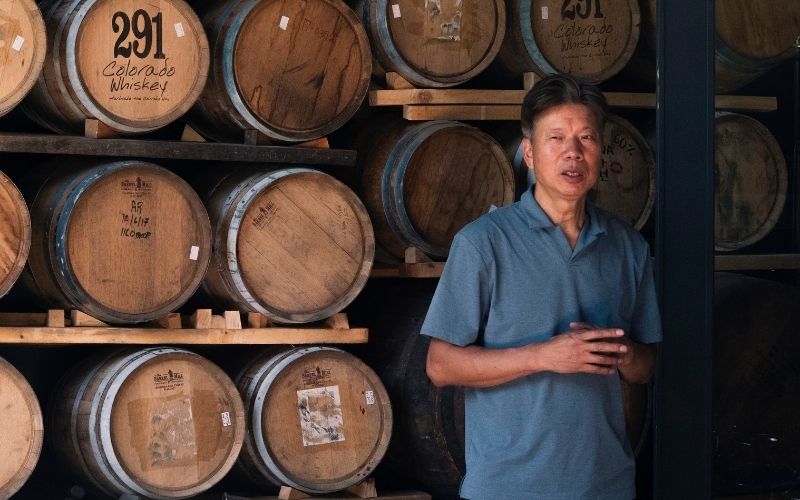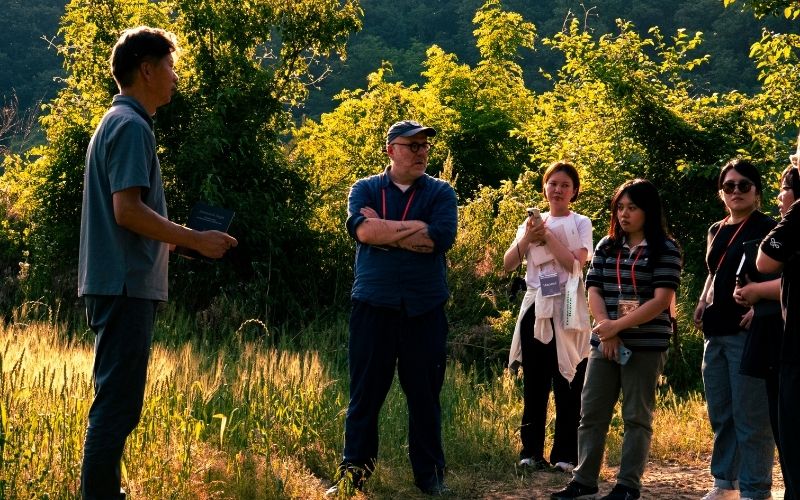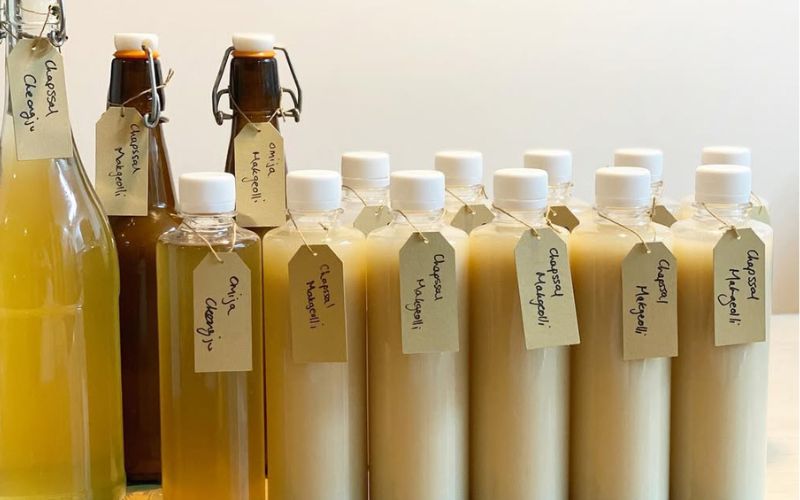In 2024, Korea’s soju exports exceeded US$200 million for the first time in history, according to data from the Korea Customs Service. Once regarded as a traditional local spirit, soju has now become a global ambassador of Korean culture, carried by the Korean Wave into restaurants, bars and homes around the world.
This milestone not only reflects the international appetite for Korean beverages, but also highlights the innovative role of domestic companies that are expanding their reach and shaping the future of K-beverages.
I regularly follow the Korea webzine published on the KOCIS website, which each month presents a theme along with interesting insights into Korean culture and cuisine. Through the April 2025 edition, which highlighted A New Wave of Korean Alcohol, Intoxicated by Korea, The Flavors and Aromas Captivating the World, and More Dramatic than Dramas: Jeju, I was able to learn more about Julia’s journey and the founding of The Sool Company.
The Sool Company was founded by Julia Mellor, who completed comprehensive training in Korean traditional alcohol at the Korean Traditional Liquor Institute, the Korean Traditional Homebrewing Institute, Makgeolli School, and Susubori Academy. As the first company to adopt the term “Sool” as a classification for Korean traditional alcohols, the business rebranded as The Sool Company, evolving from a community-focused initiative to a professional enterprise emphasizing education and promotional events.
The company has received multiple accolades, including the Award for Excellence in Agriculture, Food & Beverage from the Australian Chamber of Commerce Business Awards, and the Award for Excellence in Service from the International Travel & Hospitality Awards. It has presented Korean alcohol masterclasses at The Good Food & Wine Show in Sydney and launched the first comprehensive online brewing course for international homebrewers. Its commercial brewing consulting services have been adapted fully online, assisting clients in the US, UK, Singapore, and Australia in achieving their makgeolli goals.
In Seoul, The Sool Company established its own makgeolli brewery and education center, serving both tourists and residents, while also exporting commercial brewing equipment and launching the trade agency The Sool Trader. Expanding globally, Julia Mellor moved to the Netherlands to establish European operations, creating markets and facilitating imports of craft Korean alcohol.
During the conversation, Julia shared insights about the founding of The Sool Company, her journey in Korean traditional alcohol, the company's international initiatives, and the philosophy behind their Korea Cultured tours.

The following are excerpts from an email interview conducted between 10 and 21 September 2025.
How did your experience with Makgeolli Mamas & Papas Korea inspire the creation of The Sool Company?
When I first started exploring Korean alcohol in 2012, the industry was very different from what we have today. Makgeolli simply wasn't that popular, and the concept of hand-crafted or traditional styles of makgeolli without artificial sweeteners like aspartame was quite rare to find. It was a close-knit community of passionate people, from brewers and educators to bar owners and enthusiasts, and that was what I found the most inspiring.
The core mission of MMPK and subsequently The Sool Company has always been to support, promote, and educate about those passions, and be a part of the growth of the Korean alcohol industry.
Which learning experience shaped your vision of sool and fermentation the most?
Sool fermentation is a science, but it also involves an artistry. Brewing and, indeed commercial brewing, is not an easy road to follow, so it really requires a level of joy and passion to commit to that life path.
By studying at different schools and also working with breweries and distilleries, it's very clear that even though there may be differences in outlook or strong opinions on techniques, at the end of the day, there is a commonality in the creativity and passion for the craft.
How have international awards and masterclasses helped promote sool globally?
The Sool Company has always been about communicating sool to a wider global audience, so the opportunities and recognition we have received up until now have definitely served as motivation to keep pushing our boundaries. With every international event or collaboration, we are privileged to meet more people who share our excitement for the future of sool, and it encourages us to continue the mission.
I personally moved to the Netherlands in 2022 in order to bring our services closer to Europe, and it has been a very rewarding experience thus far.
How do you adapt Korean traditions for international audiences, especially in Europe?
This is a very important consideration. When guests come to The Sool Company in Korea, they already have some understanding and interest in Korea and Korean culture, so it's a lot easier to dive deeply into the intricacies of sool. However in Europe, we are often starting from scratch, with guests having little to no knowledge of Korea, let alone makgeolli.
We always look for ways to relate Korean alcohol to other traditions, such as Belgian Lambic beers or Dutch traditional Jenever, for example. I personally have a strong interest in all traditional alcohols and their rich history, so I find it a natural way to communicate sool with that in mind. We approach sool not only as a cultural product of Korea, but also as an alcohol category that we hope will be globally recognized as easily as beer and whiskey.
Can you tell us about your new project, Korea Cultured?
Korea Cultured is the culmination of a passion project within our team. As I mentioned previously, our mission is all about supporting the artisans and craftspeople of the sool industry. We have spent so many amazing meals with brewers and artisans, sharing great food and sool together, and really connecting over our shared passions.
We wanted to create tours that aren't just about visiting great locations, but actually meeting these incredible people, and sharing experiences with them.

How is “human connection” reflected in Korea Cultured tours?
Each of our Korea Cultured itineraries is focused on regions well known for their local fermentation and sool traditions. At every brewery, distillery, farm, fermentary or tea field we visit, our guests have the opportunity to meet the masters and have the chance to really get to know them and their artistry.
Our team is not just tour guides, we are sool specialists, so we can communicate beyond just regular translation because we live and breathe the craft. We also give our guests as many opportunities to get hands-on experiences, whether it be kimchi fermentation or making makgeolli.
What can participants expect from the Andong Edition of Korea Cultured?
We are very excited for the Andong Edition of Korea Cultured, because it really is an experience like no other. Andong soju is of course well known, but the complex history and context of this part of sool heritage is rarely discussed in detail for visitors. One of the locations we visit is Jinmaek Soju, Korea's only authentic grain-to-glass wheat soju, developed from a centuries-old Andong tradition and executed with incredible skill.
Guests are treated to tractor rides and tours of the distillery by the Master himself, soaking up the stunning countryside of the Menge village. Korea Cultured is not just about sool, we also give guests a culinary experience of how to make traditional Andong 'Guksi' noodles, stay overnight in a historic hanok village, learn how to make Andong soju cocktails from a master mixologist, and taste some of the finest hand-crafted sool the region has to offer.

How are Korean beverages produced, and how has international interest grown?
The process of making sool is unique, allowing up to four categories of alcohol from the same fermentation. Rice, water, and the fermentation starter 'nuruk' create a base alcohol called Wonju, which is turbid and can reach up to 21% ABV. Wonju is often diluted to create Makgeolli, a milder beverage. If allowed to age and settle, a clear golden alcohol called Yakju or Cheongju emerges. Distilling either Wonju or Yakju produces the traditional spirit Soju.
The global interest in sool has grown alongside Korea's soft power, but the market is still dominated by mass-produced products. Misconceptions remain—for example, that soju is cheap and nothing more—largely due to limited education and infrastructure. The Sool Company aims to change this by exporting a portfolio of diverse, high-quality soju and other spirits to markets including the UK and the Netherlands.
What can visitors learn from Korea Cultured tours, and what makes beverages like makgeolli and Andong soju unique?
Fermentation culture is the backbone of Korean cuisine and beverages, but it's not just about the science. There is a lot of nuance and cultural context when it comes to the process of fermentation, and it's something that we hope guests will be able to take home with them.
Traditional techniques, folklore, and most of all local heritage are all pillars of Korean fermentation, and that is what we focus on in our Korea Cultured series.

How do you balance traditional production methods with modern and sustainable practices?
Traditional practices actually go hand-in-hand with sustainable practices in the context of Korean fermentation. So much of Korean cuisine culture is based on the idea of reducing waste products. For example when it comes to brewing makgeolli, inevitably there is leftover spent grain called 'Jigaemi'.
Many traditional breweries find ways to reuse this grain, whether it be through creating new products such as breads and snacks, or incorporating it into skincare and cosmetics.
How do regional traditions influence the production of beverages and local cuisine on your tours?
Korea is not so expansive geographically, but the difference in cuisine and sool production regionally is quite dramatic. Andong, for example, has had a tradition of distillation for thousands of years, so much so that recently it achieved official appellation from the Korean government to protect its heritage.
This is contrasted with other regions that have local agricultural products or traditional recipes that have endured the test of time. The Korea Cultured series is designed into regions specifically to highlight those unique regional traditions and specialties.
How does growing global interest in Korean beverages and cuisine promote Korean culture?
The growing interest in Korean beverages and cuisine has been on a steady rise internationally, but we still have a challenge when it comes to promoting Korean traditional culture. For us at The Sool Company, we are primarily focused on communicating the traditional heritage and innovation of craft within the sool industry, which is somewhat outside the box of the current Hallyu popularity.
While Korea's popularity globally is helpful, we hope to find sustained growth and development within the wider alcohol industry context and find appreciation outside of the current K-trends.
What are the next steps or upcoming projects for The Sool Company?
With our operations in Korea and the continued establishment of our presence in Europe, we have a lot planned! At the moment, we are heavily focused on our trade services, helping companies import quality Korean alcohol into their local markets.
By making craft sool more accessible globally, we hope to achieve our goal of supporting the Korean alcohol industry in international markets.
How about this article?
- Like4
- Support0
- Amazing6
- Sad0
- Curious0
- Insightful0


